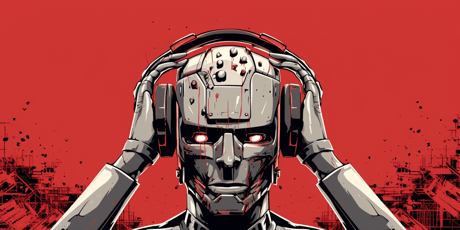-
 Written by Sean Dougherty
Written by Sean DoughertySenior Brand Creative at Funnel, Sean has more than 15 years of experience working in branding and advertising (both agency and client side). He's also a professional voice actor.
Recently, a few Funnelers took time to share the seven marketing-related things they were tired of hearing about — be the topics overstated, underwhelming, or just plain annoying. Now, in honor of our second annual Marketing Data State of Play report covering the transformation wrought by artificial intelligence, fellow Funnelers again got together to air their grievances.
We present to you: The seven marketing things we’re tired of hearing about — AI edition.
Related reading: Marketing data state of play 2024
People won’t shut up about it
Patrik Bergquist, a revenue development representative, is ready to kick things off by ending it all. He has heard about AI so much over the past year or more that he can’t take listening to another podcast about it.
“I use AI to help me with various tasks in the same way I use CRMs to email prospects,” said Patrik. “The difference is people know not to talk about CRMs 24/7.”
Let’s just assume Patrik is a bit, um, “oversaturated” with AI content. Let’s move on, though.
AI LinkedIn influencers
Hannah Hoyle, a customer success provider for Essentials plans, has a gripe that almost anyone on social media can relate to. No matter what the trend is, be it an emerging technology, a TikTok challenge, or a new fashion wave, it is almost a universal law that it (eventually) becomes overhyped and overdone by social media influencers.
While you might expect to see social media users on more mass-market platforms, you might not realize that LinkedIn is full of influencer-types trying to build clout while the opposition themselves for their next role. Over the past year or so, these LinkedIn influencers have been easy to spot, since they all tended to post about one thing: AI.
Hannah sums it up best.
“Posts always pop up on my feed like ‘If you haven't heard about this new AI update, you're so behind! It's Monday morning, stop stressing me out,” said Hannah. “Who has time to keep up with all of this? Not me; that's for sure!”
Preach, Hannah. Preach.
Overuse of the term
Our own head of content marketing, Chris Van Mossevelde, also wanted to point out a particular annoyance. In his view, AI is simply overused.
There is already debate about whether current generative AI tools can be called “artificial intelligence” or whether they are just fancy remix machines. But Chris’ point goes further. In his view, AI seems to be slapped on to everything lately in order for brands to ride the hype train.
“I suspect we call everything ‘AI’ just to sound clever,” said Chris. “But let’s PLEASE stop using AI as a catch-all term just because it's hip. What’s next? The AI-powered toaster?”
It’s almost like the professional world is mirroring the Ant-Man movies where everything gets prefixed with “quantum” to sound mysterious and powerful. Maybe a little more restraint would serve us well across the board.
The notion that AI is perfection
Another one of our revenue development representatives, Emily Maguire, is tired of hearing how AI is put on a pedestal of perfection in people’s minds.
"Many seem to think AI is without flaws,” said Emily, “but it couldn't be further from the truth. It's still difficult to see at this point what biases these systems may have or develop over time. Relying on these tools that are in a fragile stage can be dangerous without a human touch, which is where marketing/sales teams come in. We have to work with AI, not just trust it.”
It’s a great point to keep in mind. Though they may seem highly advanced, these tools were still built by humans and trained on content created by humans. That means we can expect to see many familiar biases rear their heads in unexpected ways in the future.
AI get-rich-quick schemes
Any time a new technology or communication method emerges, human beings show off their creative prowess by using them to create new cons and frauds to make a quick (and illicit) buck. While generative AI may not be as worthless as snake oil, that doesn’t stop thousands of online denizens from building often fraudulent get-rich-quick schemes around the promises of AI.
Our employer branding specialist, Martin Solaja, is quick to highlight this.
“What I can't stand about AI is that people post stuff on social media claiming you can earn thousands of dollars by getting loads of clients and offering your services (i.e., creating a logo) cheap, and then let AI do the creative work,” said Martin. “Creative work takes thought and time to be unique. We literally proved this in one of our recent YouTube videos.”
Thanks for sticking up for the creative workers, Martin! But wait. If those schemes are fake, what about the person in the Instagram comments who promised to give away $500,000 to the first 10 people to DM them?
Having an opinion about AI
The shortest but most poignant perspective comes from our content producer, Amanda Lundin. She feels as though everyone is rushing to make judgments:
“Everyone brings AI up as if you need to have an opinion on it. I don't have one, yet”
Indeed, these are still the early days for generative AI, which promises exponential future growth. Perhaps it’s best to wait and see what it really can do for us, and where its biases emerge before we fully form our opinions.
Ethical issues
Our final AI hot take comes from self professed “IT dude” and “technomancer,” Simon Rezazadeh. It revolves around the idea that many of these generative AI tools are crawling across (and regurgitating) rights-protected intellectual property.
For most of the affected artists, their works were vacuumed up without any notification, compensation, or ability to opt out of the process.
“Artists, writers and creators are not getting any credit, because of greed and disregard for the value they bring” said Simon. “They shouldn’t have to add stupid algorithms and techniques [to their work] to opt out. Make it opt-in and see all the models fall apart due to lack of legitimately obtained data.”
Putting dreams of a real-world Skynet aside, this is one of the most controversial topics around current-generation AI tools. While historical works (art, literature, music, etc.) reside in the public domain and are free to use without paying royalty or licensing fees, many contemporary works are still legally protected from reproduction. That hasn’t stopped AI from using them, though.
AI tools have crawled vast swaths of the internet, including those contemporary works, to train themselves. As AIs incorporate these works into their own outputs (and charge users a fee for the use of the AIs), it may be considered an illegal violation of intellectual property law. In some cases, artists are suing the companies that created generative AI tools. It will certainly be something to keep our eyes on moving forward.
Did we miss something?
This was just a small sampling of some of the hottest takes flying around the Funnel offices. But we know there are more. Lots more.
If you have an AI hot take, or want to share something AI-related that you’re tired of hearing about, let us know. Hit us up on LinkedIn, or jump into the comments on our YouTube channel. We’ll see you there.
Disclaimer: The featured image for this article was created using generative AI.
-
 Written by Sean Dougherty
Written by Sean DoughertySenior Brand Creative at Funnel, Sean has more than 15 years of experience working in branding and advertising (both agency and client side). He's also a professional voice actor.
